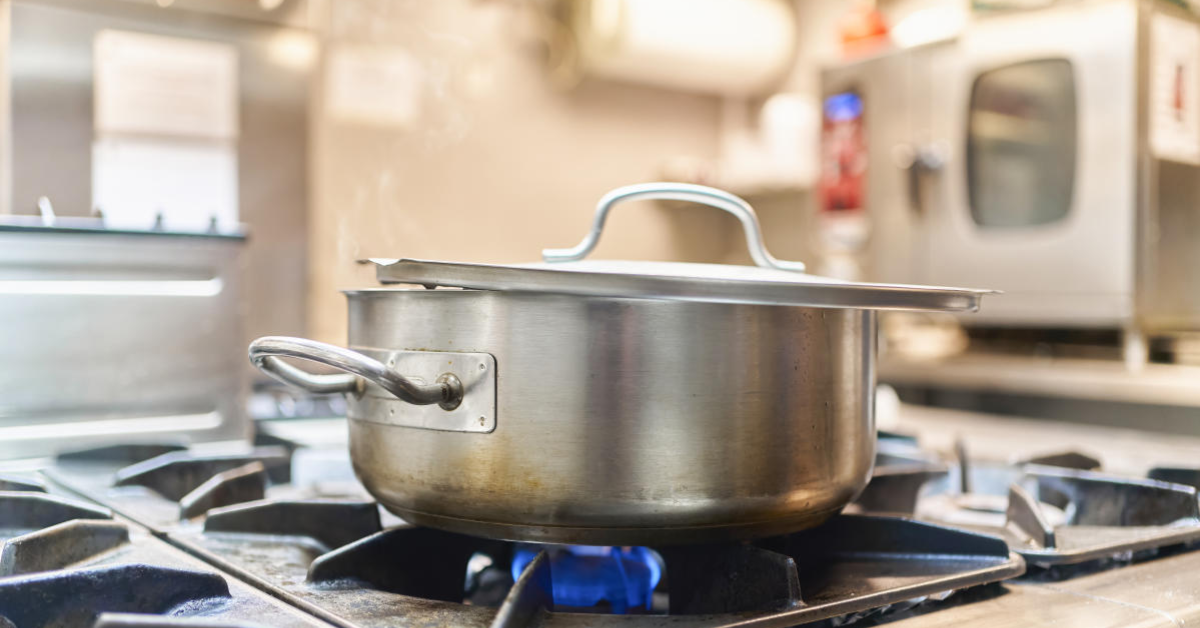Cookware is an essential part of every kitchen, but many of the pots and pans you use might be hiding a serious risk to your health. With a growing focus on the health concerns of aluminum cookware, it’s important to understand which options are safer and how you can make simple changes to your kitchen for better health. In this article, we will explore the risks associated with aluminum cookware, how to identify potentially hazardous items in your kitchen and suggest safer alternatives.
The Problem with Non-Anodized Aluminum Cookware
Aluminum cookware is widely used due to its affordability, lightweight, and even heat distribution. However, not all aluminum cookware is the same. Non-anodized aluminum, in particular, has raised concerns among experts due to its potential to leach harmful substances, such as lead, into your food. This can pose a significant health risk, especially to children, pregnant women, and breastfeeding mothers, who are particularly vulnerable to lead poisoning.

A study conducted by researchers in Washington tested 100 different cookware items made from non-anodized aluminum, brass, and stainless steel. Their findings were alarming—many of the aluminum cookware items tested released enough lead to present a risk of poisoning.
“This finding is especially concerning for children and pregnant women due to the harmful effects of lead on brain development,” said Katie Fellows, one of the authors of the study. The U.S. Food and Drug Administration (FDA) took action following these findings by advising retailers to avoid distributing these risky aluminum cookware products.
What is Non-Anodized Aluminum?
Non-anodized aluminum is a type of aluminum that hasn’t gone through an additional process called anodization, which helps create a protective layer on the surface. This makes it more prone to leaching harmful substances like lead and aluminum, especially when cooking acidic foods like tomatoes, vinegar, or citrus. It is lighter than other materials and may appear duller compared to shiny aluminum cookware.

“Non-anodized aluminum cookware tends to have a different look and feel compared to the more common types of cookware you see in American stores,” says Laura Williams, a health expert. “When I lived in Costa Rica, the cookware I had was non-anodized aluminum, and it felt distinctly different from what I was used to in the U.S.”
Safer Alternatives to Non-Anodized Aluminum Cookware
While non-anodized aluminum presents significant risks, there are safer alternatives available. According to the researchers, cookware made from stainless steel, cast iron, and ceramic materials presents far fewer risks of leaching harmful metals. These materials are durable, can last for many years with proper care, and have minimal risk of contaminating food with harmful substances.
- Stainless Steel: Stainless steel cookware is highly recommended as a safer alternative. It is resistant to corrosion and doesn’t leach harmful substances when used for cooking.
- Cast Iron: Cast iron cookware is another excellent option. It is incredibly durable, and when well-seasoned, it can be a great tool for cooking without the worry of metal leaching into your food.
- Ceramic: Ceramic cookware is also a popular choice for those seeking a non-toxic, eco-friendly option. Ceramic cookware is known for even heat distribution and is free from harmful chemicals, making it a safe alternative.
Risks with Nonstick Cookware
While nonstick cookware like Teflon has become popular due to its ease of use, it does come with its own set of risks. Nonstick coatings can break down at high temperatures (over 500°F), releasing toxic fumes. If the coating becomes scratched, it can also start to flake off and mix with your food, causing potential harm.
“Pots and pans with nonstick coatings, particularly Teflon, may be a cause for concern,” says Wesley McWhorter, a spokesperson for the Academy of Nutrition and Dietetics. “It is important to be cautious when using nonstick cookware, especially if the coating has been damaged or the pan is used at high temperatures.”
How to Reduce Exposure to Harmful Materials
If replacing your cookware right away isn’t possible due to budget constraints, there are still ways you can reduce your exposure to harmful substances. Here are some tips:
- Hand-Wash Cookware: Avoid using harsh scrubbers that can scratch cookware surfaces, especially nonstick pans or aluminum cookware. Use a mild soap and a non-scratching scrubber to clean your kitchenware.
- Avoid Cooking Acidic Foods in Aluminum: Acidic foods, such as tomatoes, vinegar, and citrus, can cause aluminum to leach into your food. Try to avoid cooking these foods in non-anodized aluminum cookware.
- Don’t Store Food in Aluminum: If you store food in aluminum cookware, be aware that the longer the food stays in contact with aluminum, the more likely it is to leach harmful metals into the food.
- Cook on Low to Medium Heat: If you must use nonstick cookware, avoid using high heat to prevent damaging the coating. Stick to lower temperatures to reduce the risk of harmful fumes.
Auditing Your Kitchen for Aluminum Cookware
A great first step toward improving your kitchen’s safety is to conduct an audit of the cookware you already own. Look for any aluminum-based products, especially non-anodized items. Common places you might find non-anodized aluminum include baking dishes, cookie sheets, roasting pans, measuring cups, and even large pots used for boiling or simmering.
If you find aluminum cookware that may be hazardous, consider replacing it with safer alternatives like stainless steel, cast iron, or ceramic. If you’re on a budget, try replacing just a few items at a time, such as a nonstick pan or an old aluminum pot.
Top Nontoxic Cookware Recommendations
If you’re ready to replace your cookware, here are some top-rated nontoxic cookware options that are safe, durable, and effective:
- Lodge Cast Iron Skillet: Lodge is known for making high-quality cast iron skillets, and the Blacklock Skillet is no exception. It’s affordable, lightweight for its size, and offers excellent heat distribution.
- Victoria Cast Iron Skillet: For a budget-friendly cast iron option, the Victoria Cast Iron Skillet is highly recommended. It’s known for its smooth surface and reliable cooking performance.
- GreenPan Valencia Pro Hard Anodized Fry Pan Set: These eco-friendly, ceramic-covered, nonstick pans are a great alternative for those looking for non-toxic cookware at an affordable price.
- Calphalon Classic Stainless Steel Cookware Set: A high-quality stainless-steel set that offers a balance of affordability and durability. Perfect for those looking to upgrade their entire cookware collection.
- Caraway Nonstick Ceramic Cookware Set: Caraway offers a beautiful, non-toxic ceramic cookware set that’s both stylish and functional. It’s a bit of an investment, but it’s worth it for its durability and nonstick properties.
Conclusion
Switching to safer cookware is an important step toward protecting your health and the health of your family. Non-anodized aluminum cookware, while affordable, poses a significant risk due to its potential to leach harmful metals like lead into your food.
By opting for stainless steel, cast iron, or ceramic cookware, you can reduce your exposure to these dangers and cook safely for years to come. Auditing your kitchen and replacing old cookware with nontoxic alternatives is a simple yet effective way to ensure the safety of your meals.
Disclaimer: This article has been meticulously fact-checked by our team to ensure accuracy and uphold transparency. We strive to deliver trustworthy and dependable content to our readers.







Leave a Comment